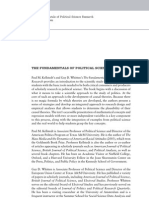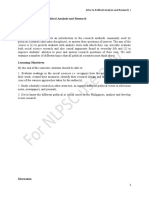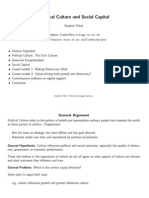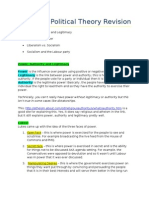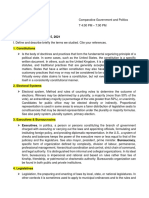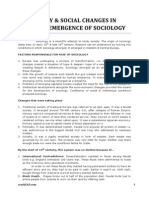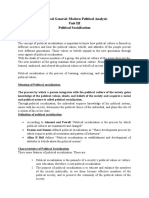Ps Political Culture
Ps Political Culture
Uploaded by
jambit03Copyright:
Available Formats
Ps Political Culture
Ps Political Culture
Uploaded by
jambit03Copyright
Available Formats
Share this document
Did you find this document useful?
Is this content inappropriate?
Copyright:
Available Formats
Ps Political Culture
Ps Political Culture
Uploaded by
jambit03Copyright:
Available Formats
Jedi Cristal M.
Bentillo AB Political Science II
Political Science 1 MWF 12:55-1:55 (S302)
UNDERSTANDING THE PHILIPPINE POLITICAL CULTURE
By Diana J. Mendoza
(A DETAILED OUTLINE)
I) PROLOGUE: WHAT IS POLITICAL CULTURE?
MENDOZAs essay aims to study the Philippine political culture. As cited in the first part of the selection, the study of political institutions (such as political parties, legislature, interest groups, bureaucracy, etc) and how these processes operate; only represent one-half of the equation. TO provide a full understanding of a societys political processes, the study of its Political Culture is necessary. Since the study of political culture has a significant effect on the societys choice of political institutions. WHAT IS POLITICAL CULTURE? This refers to the peoples attitudes and orientation to politics. Since the attitudes and values of the members of the society influence the social and political decision making. The Political culture conditions the behavior of individuals and CHOICE. This also refers to the set of shared attitudes, beliefs and values within the entire populations, as well as . . . . within separate parts of that population. A) HISTORY The term political culture first coined in the United States in the 1950s, since then had been defined in variety of ways. (1) Sidney Verba Defined political culture as the system of empirical beliefs, expressive symbols and values which defines the situation in which political action takes place. (2) Gabriel Almond & G. Bingham Powell They concentrated their work on the attitudes and orientations towards politics among the members of a given political system. Which led them to identify : 1. THREE CORE INDIVIDUAL-BASED ORIENTATIONS a. Cognitive Orientation It centers on knowledge and information, accurate or otherwise, of the political system, its roles and the incumbents of these roles, its processes, and performance.
b.
Affective Orientation
c.
This refers to the feelings with respect to the political systems institutions, roles, personnel, processes and performance. Evaluative Orientation This orientation embodies judgments and opinions about the political system, its processes, and outputs.
B) CONCLUSIVE REMARKS In its simplest forms, political culture refers to the set of values, attitudes, beliefs and orientations, which influences the publics perception of politics. (1) COMPONENTS OF POLITICAL CULTURE
1. ATTITUDES the psychological orientations toward political objects,
frequently involving normative conceptions of how things ought to be. ATTITUDES TOWARDS AUTHORITY i. Egalitarian Peoples attitudes are relatively equal in their capacity to assume political roles and to make political judgments. ii. Deferential Some people are more qualified to occupy leadership roles, but have obligations to rule in the general interest and should be held accountable for the results of their rule. iii. Authoritarian Some people are clearly more qualified to rule than others. The duty of the rest is unquestioned obedience.
2. BELIEFS the conceptions of how things are, which may or may not be
accurate. BELIEFS BEHIND POLITICAL DECISIONS: i. Ideologism A disposition to make political decisions based on their CONSISTENCY WITH A SET OF PRINCIPLES. ii. Pragmatism A TRIAL AND ERROR BASIS of teaching political decisions on the basis of results without regard to principles.
3. FEELINGS the EMOTIONAL attachment and reactions.
Emotions spurred by political observation and/ or participation. i. AFFECT A sense of belonging to the political system, that one has an interest in the well-being and success of the system, marked by a tendency to regard the system as us rather than them. ALIENATION A sense of detachment from the system, that the interests of the system are distinct from ones own interest, marked by a tendency regard the system as them.
ii.
4. COGNITION the knowledge and information. 5. VALUES
the priorities and goals (when framed in terms of particular object, values become attitudes) that may define the nature of the system (such as freedom or equality).
(2) SUBSTANTIAL CULTURAL DIVERSITY IN SPITE of the distinctive national pattern of attitudes and values identified within a nation, substantial variation among individuals may still exist. Furthermore, not only individuals vary, but as well as groups with distinctive political orientations may as well vary. In other words, any given political culture, usually HAVE a number of political subcultures. For instance, the Chinese and Muslim minority groups have been well accommodated and accepted as distinct political subcultures at present. IT IS WORTHY to note, that a nations political culture, is THE PRODUCT OF HISTORY and is transmitted across generations through social institutions such as the FAMILY.
II) POLITICAL CULTURE ~ Ideology ~ PUBLIC OPINION (A CONTRAST)
A) IDEOLOGY THIS refers to an explicit doctrinal structure, providing a particular diagnosis of the ills of society plus accompanying action program for implementing the prescribed solutions. i) CONTRAST BETWEEN POLITICAL CULTURE MEANWHILE, political culture refers to vaguer, more implicit orientations which may include MORE THAN ONE IDEOLOGY. As a CONCEPT, political culture is broader and more abstract in nature. It includes the peoples ideologies, but goes incorporate unexpressed attitudes that affect voting behavior and perceptions of how the political system works. IDEOLOGIES; along with Political attitudes; come and go, which can change with some frequency. Unlike political culture, is a broad and enduring pattern of behavior which defines the way people RELATE WITH EACH OTHER. B) PUBLIC OPINION THIS HELP reflect short-term outlook, often issue-specific in scope, and attitudes that may vary considerably within a society and change from week to week. i) CONTRAST BETWEEN POLITICAL CULTURE
ON THE OTHER HAND, political culture reflects a societys more deep-seated values and attitudes that are far more pervasive and change far more slowly than public opinion. Political Culture includes the society members underlying feelings towards politics & government, meanwhile, public opinion focuses on transient views about specific leaders, policies and issues.
III)
CLASSIFICATION OF POLITICAL CULTURES
A) DEMOCRATIC Political Cultures
FEATURE a willingness of its LEADERS to follow the will of the majority along with a widely-held respect for rights of minorities. In which, incorporates a widespread tolerance for DIVERSE OUTLOOKS, including unpopular or dissenting viewpoints.
B) AUTHORITARIAN Political Cultures
SUPPORT governmental systems in which decisions are made by a few for the whole people, and in which PUBLIC DISSENT in not tolerated. This kind of political culture REJECTS the DEMOCRATIC VALUE of tolerance for dissent.
i) TRADITIONAL TRAITS
The Philippine state contains more of a basis for democracy than for authoritarianism. Here are some traditional traits underpinning modern democracy:
(1)The CONSULTATIVE decision-making of the ancient BARANGAY;
(2) The PRAGMATIC BARGAINING of interpersonal relationships and; (3) The ABILITY to ACQUIRE POLITICAL STATUS through achievements ii) CONSTRAST (DEMOCRATIC-AUTHORITARIAN) DEMOCRATIC Cultures DEMOCRATIC political structures allow free expression & transmission of ideas. This OPENNESS provides opportunities for people to learn about politics and felt that participation is both possible and effective. AUTHORITARIAN Cultures This political culture LIMITS the diversity and amount of information that is transmittable. The peoples ability to learn about politics and the perception of being a viable member of the society is therefore HINDERED.
C) THE CIVIC CULTURE: THREE RELATION-BASED Types of POLITICAL CULTURE
(BY G. ALMOND & SIDEL VERBA) i) Parochial THIS relation-based type of political culture is dominated by people who are concerned almost entirely with LOCAL POLITICAL ISSUES. The term parochial (of a parish), pertains to the immediate locality. This type of political culture is described as: (1) People having LIMITED KNOWLEDGE about the national political system; (2) Have little or NO BELIEF that the people can INFLUENCE government decisions; (3) Express LITTLE APPRECIATION of how government policies affect their own lives;
(4) The members pays NO ATTENTION to politics and SELDOM SPEAK about political matters; (5) Usually found among people living in REMOTE RURAL REGIONS of underdeveloped countries(who lack the means to gain information about their larger society) ii) Subject This type of political culture is described as: (1)People found in the SLUMS OF MAJOR CITIES; (2)People are SOMEWHAT informed & aware of how government policies influence their own lives; (3)The level of the members political involvement still tends to be LOW; (4)The members feel POWERLESS to influence government policies even at the local level; (5) People often do not UNDERSTAND how to INFLUENCE policy makers. (6) This culture is most prevalent in moderately developed, SEMI-AUTHORITARIAN societies iii) Participant This type of political culture is described as: (1) People FEEL FREE to participate; (2) The People BELIEVES that their participation affects decision-making; (3) Have ENOUGH information available to make sense of at least some of the major political issues and; (4) Usually found among major Western democracies. According to Almong and Verba, all political systems contain some MIX OF INDIVIDUALS (parochial, subject, participant), but the proportion of the population belonging to each types varies considerably. Depending on: a. SOCIO-Economic levels; b. DEMOGRAPHIC factors and; c. The NATURE of the political system AS Governmental policies play an important role in encouraging or discouraging the participation in the society, what really matters is that the increase of a relatively- size participant culture, RISES the LEVELS OF EDUCATION and increasing URBANIZATION. D) THE PHILIPPINE POLITICAL CULTURE (A CLASSIFICATION) David Wurfel described the Philippines as having both parochial & subject political cultures. Meanwhile, Onfre D. Corpuz described the Filipino political culture that has a superstructure of attitudes and values of WESTERN origin, resting on a definitely indigenous infra-structure. FROM THE WEST comes INDIVIDUALISM and high respect for achievement and for the rule of law. (a) Public Opinion Surveys (1)Social Weather Station (SWS) (2) Ateneo Public Opinion Survey (3)Felipe Mirandas ANALYSIS OF FILIPINOS PUBLIC OPINION
IV) THE PHILIPPINE POLITICAL CULTURE
SCHOLARS have identified a number of political and non-political factors that shape and determine a societys political culture. And these are: (1) General CULTURE (2) Political Socialization (3) HISTORY (4) Sub-cultures A) FILIPINO VALUES & PRACTICES
i) Clifford Geertzs DEFINITION of Culture
~an historically transmitted pattern of meaning embodied in symbols, a system of inherited conceptions expressed in symbolic forms by means of which men communicate, perpetuate, and develop with knowledge about and attitudes towards life. A WORLDVIEW perspective of CULTURE that explaining why and how individuals and groups BEHAVE AND DO. CULTURE also includes beliefs, customs, rituals, behaviors, expectations and motives that are internalized by subject individuals and widely shared by the people. IN THE PHILIPPINE CONTEXT, these are some FILIPINO VALUES: (a) Pakikisama- SMOOTH INTERPERSONAL RELATIONSHIP (b) Utang na Loob- DEBT OF GRATITUDE (c) Personalism (d) Particularism FILIPINO PRACTICES: (a) Patron-Client Relations This NETWORK, is usually based on patrons wealth and then on his access to the resources of the state (b) Dualism: Cacique Relationship (c) Cultural Analysis (1) Howard Ross (2) Napoleon Chagron (3) Edward Banfield Amoral Familism (4) Alfred McCoy 1. Political Alliances/Dynasties 2. Kamag-anak (Clan) Primacy 3. Family Primacy (5) Frank Golay Primacy of Kinship ties (6) Carl Lande Patron-client Relationship: Favoritism & Nepotism (7) Abner Cohen Political uses of Culture Marcos Regime: Religious Institutions Political Mobilization B) POLITICAL SOCIALIZATION i) DEFINITION (a) A LEARNING PROCESS (b) STAGES
(c) AGENTS ARTICULATION (a) INDOCTRINATION (b) Educational System (c) Political Participation iii) HISTORY ~ POLITICAL CULTURE RELATIONSHIP (a) Mehran Kamrava (b) Lucian Pye iv) PHILIPPINE HISTORY (a) Jamie Mackie & Bernardo Villegas (b) Alfredo & Grace Roces (c) Onofre Corpuzs argument (1) Marcos Martial Law C) POLITICAL SUBCULTURES i) CHINESE POLITICAL SUBCULTURE ii) MUSLIM POLITICAL SUBCULTURE ii)
IV)CONCLUSION
You might also like
- Get Community Psychology in Pursuit of Liberation and Well Being 3rd Manuel Riemer Free All ChaptersDocument61 pagesGet Community Psychology in Pursuit of Liberation and Well Being 3rd Manuel Riemer Free All Chaptersaroldiyeda100% (4)
- Representing Ophelia: Women, Madness, and The Responsibilities of Feminist Criticism by Elaine ShowalterDocument5 pagesRepresenting Ophelia: Women, Madness, and The Responsibilities of Feminist Criticism by Elaine ShowalterAndrei Biziorek100% (3)
- KetamineDocument1 pageKetamineLorraine80% (5)
- The Nature and Meaning of Public AdministrationDocument8 pagesThe Nature and Meaning of Public AdministrationHanna AberoNo ratings yet
- Political Process Theories 1 PDFDocument4 pagesPolitical Process Theories 1 PDFDhong Paghubasan LepitenNo ratings yet
- Fundamental of Political ScienceDocument17 pagesFundamental of Political ScienceUsman Riaz33% (3)
- PolSci 2Document123 pagesPolSci 2loveriarNo ratings yet
- Political Alienation: David C. SchwartzDocument3 pagesPolitical Alienation: David C. SchwartzFilo SofíaNo ratings yet
- Accepting Authoritarianism: State-Society Relations in China's Reform EraFrom EverandAccepting Authoritarianism: State-Society Relations in China's Reform EraRating: 4 out of 5 stars4/5 (2)
- Stage Fright Pranic HealingDocument5 pagesStage Fright Pranic HealingHitesh Parmar100% (1)
- Natural Evolution in The Growth of The Behavioral ApproachDocument3 pagesNatural Evolution in The Growth of The Behavioral ApproachRJ SalNo ratings yet
- Interest Groups: Voice of The People or NuisanceDocument7 pagesInterest Groups: Voice of The People or NuisancemahiNo ratings yet
- Topic 3 Theoretical Perspective of Policy Making 2015Document38 pagesTopic 3 Theoretical Perspective of Policy Making 2015Mohamad FarisNo ratings yet
- Intro Political Analysis and ReseachDocument56 pagesIntro Political Analysis and ReseachDhanaNo ratings yet
- Multi Party System Pol SCDocument20 pagesMulti Party System Pol SCKanchan VermaNo ratings yet
- Public Policy and Its TheoriesDocument20 pagesPublic Policy and Its TheoriesSHUBHASH CHANDRA PATHAKNo ratings yet
- The Scope and Development of Political SociologyDocument4 pagesThe Scope and Development of Political SociologyshriyaNo ratings yet
- Is Political Science A ScienceDocument2 pagesIs Political Science A ScienceKevo100% (1)
- Syllabus - Political Sociology - MAPol Science - 901C English - 21072017Document188 pagesSyllabus - Political Sociology - MAPol Science - 901C English - 21072017AgZawNo ratings yet
- Nature and Scope of Public AdministrationDocument3 pagesNature and Scope of Public AdministrationDodong LamelaNo ratings yet
- Political Culture LectureDocument19 pagesPolitical Culture Lectureblue_july2000100% (3)
- PAPER-1 - Political Science PDFDocument76 pagesPAPER-1 - Political Science PDFVishal TiwariNo ratings yet
- Pathways From AuthoritarianismDocument15 pagesPathways From Authoritarianismchengyi1988100% (1)
- Defining Political DevelopmentDocument73 pagesDefining Political Developmentsofronio v aguila jrNo ratings yet
- Contemporary Political TheoriesDocument23 pagesContemporary Political TheoriesHanif M NoorNo ratings yet
- Topic 5 State and Non State ActorsDocument4 pagesTopic 5 State and Non State ActorsDamilola ObadanNo ratings yet
- Lecture Notes Social Contract TheoryDocument12 pagesLecture Notes Social Contract TheoryBilal Akhter100% (1)
- Unit 1 (Political Science)Document12 pagesUnit 1 (Political Science)sakura yuimikoNo ratings yet
- Theories of Political ParticipationDocument12 pagesTheories of Political ParticipationPankaj Patil100% (1)
- What Is Political TheoryDocument2 pagesWhat Is Political TheoryShriya OjhaNo ratings yet
- Behaviouralism NoteDocument4 pagesBehaviouralism NoteDavid Honey Diviya100% (1)
- Political Theory RevisionDocument6 pagesPolitical Theory RevisionPax McFarlaneNo ratings yet
- Summary of The Public Policy Primer BookDocument2 pagesSummary of The Public Policy Primer BookKalsoomNo ratings yet
- Political SocializationDocument9 pagesPolitical SocializationTahmina Akter AkhiNo ratings yet
- Scholarly Definitions of Public AdministrationDocument8 pagesScholarly Definitions of Public AdministrationMuhammad Umair Azam100% (1)
- Meaning and Importance of Comparative PoliticsDocument10 pagesMeaning and Importance of Comparative PoliticsEevee CatNo ratings yet
- Political Culture and Political StabilityDocument15 pagesPolitical Culture and Political Stabilitysakshi100% (1)
- Populism and DemocracyDocument32 pagesPopulism and DemocracyDiego AngelNo ratings yet
- Comparative PoliticsDocument4 pagesComparative PoliticsLoojee BaylesNo ratings yet
- Indicators of Social Development Complete PDFDocument48 pagesIndicators of Social Development Complete PDFsukritichib30No ratings yet
- Grade 12 - Saint Teresa of Calcutta: Geronimo, Camille Patricia BDocument5 pagesGrade 12 - Saint Teresa of Calcutta: Geronimo, Camille Patricia BCamille GeronimoNo ratings yet
- Conservatism: Pros & ConsDocument7 pagesConservatism: Pros & ConsPete100% (1)
- Approaches To The Study of Indian PoliticsDocument7 pagesApproaches To The Study of Indian PoliticsANDRINA JOYSON 2130741No ratings yet
- CGP - Define and Describe Briefly The Terms We Studied - Momo - 2CED-4aDocument4 pagesCGP - Define and Describe Briefly The Terms We Studied - Momo - 2CED-4aJomillen Cautiverio MomoNo ratings yet
- Politics Concept of StateDocument24 pagesPolitics Concept of StateALLIANNA DANIELLE CRISTENo ratings yet
- Sample Notes of Sociology OptionalDocument111 pagesSample Notes of Sociology OptionalJainPalash100% (1)
- Politics Defined: Andrew Heywood David EastonDocument4 pagesPolitics Defined: Andrew Heywood David Eastonwad skwedNo ratings yet
- Political TheoryDocument7 pagesPolitical Theoryjenee kasumi aino nariesNo ratings yet
- Institutional ApproachDocument7 pagesInstitutional ApproachEevee CatNo ratings yet
- Power: Prepared By: Lorena C Valerio, LPT, DPADocument30 pagesPower: Prepared By: Lorena C Valerio, LPT, DPATANYA BERNICE VILLAPRUDENTENo ratings yet
- Political SociologyDocument7 pagesPolitical SociologyZain Ul Abideen100% (1)
- Approach To Political ScienceDocument17 pagesApproach To Political ScienceRandy Raj OrtonNo ratings yet
- Victor Project 1-5 Zoning Policy and Development of Democracy in NigeriaDocument62 pagesVictor Project 1-5 Zoning Policy and Development of Democracy in NigeriaJoseph I OkohNo ratings yet
- The Role of Civil Society and Interest Groups in Public Policy DevelopmentDocument12 pagesThe Role of Civil Society and Interest Groups in Public Policy DevelopmentAfrican Centre for Media ExcellenceNo ratings yet
- ShorthandDocument7 pagesShorthandsurbhi prajapatiNo ratings yet
- Political Development - ConceptDocument4 pagesPolitical Development - ConceptKotha SarkerNo ratings yet
- Political SocialisationDocument6 pagesPolitical SocialisationDivyank SurumNo ratings yet
- PSIR OPTIONAL, Political Theory Meaning and ApproachDocument7 pagesPSIR OPTIONAL, Political Theory Meaning and ApproachankitsaurabhNo ratings yet
- Political ModernizationDocument11 pagesPolitical ModernizationSnow manNo ratings yet
- System TheoryDocument5 pagesSystem TheoryJeanneth CapilitanNo ratings yet
- Structure, Power, and Functions of JudiciaryDocument8 pagesStructure, Power, and Functions of JudiciarySubhodip MalakarNo ratings yet
- Final ExamDocument16 pagesFinal ExamCathy CathNo ratings yet
- Calonia Gwapa Sending Habits RRLDocument3 pagesCalonia Gwapa Sending Habits RRLdaisydadatNo ratings yet
- Controlling The Sales ForceDocument19 pagesControlling The Sales ForceRajKamNo ratings yet
- Fax Machines Assignment InfoDocument2 pagesFax Machines Assignment Infoapi-248787958No ratings yet
- Top 10 Dos and Donts For MarriageDocument1 pageTop 10 Dos and Donts For MarriageanyaNo ratings yet
- Text Linguistic SummaryDocument6 pagesText Linguistic SummaryInf INARANo ratings yet
- BENEITO MONTAGUT - Ethnography Goes OnlineDocument20 pagesBENEITO MONTAGUT - Ethnography Goes OnlineSheila CavalcanteNo ratings yet
- Articol Lorelei Caraman-Pasca PDFDocument9 pagesArticol Lorelei Caraman-Pasca PDFL.CNo ratings yet
- Lesson Plan 101 (January 25, 2019)Document3 pagesLesson Plan 101 (January 25, 2019)Jayzelyn YarasNo ratings yet
- 2013 Journey PlannerDocument34 pages2013 Journey Plannersanela_karićNo ratings yet
- Chapter 1 Lesson 2. Importance of Quantitative Research Across FieldsDocument4 pagesChapter 1 Lesson 2. Importance of Quantitative Research Across FieldsKarl Latupan71% (14)
- The Horror of ExistenceDocument17 pagesThe Horror of Existencejosh6692No ratings yet
- Mobile LegendsDocument8 pagesMobile Legendsdhendhen lipataNo ratings yet
- Gumucio-Making Waves (En)Document358 pagesGumucio-Making Waves (En)Alfonso Gumucio Dagron100% (1)
- Meursault An Absurd Happy Man PDFDocument8 pagesMeursault An Absurd Happy Man PDFsamridhi chhabraNo ratings yet
- Storytelling: The Modern Marketer's Greatest Yet Most Dangerous ToolDocument3 pagesStorytelling: The Modern Marketer's Greatest Yet Most Dangerous ToolBusiness Expert PressNo ratings yet
- How To Measure Distance Visual Acuity: IndicationsDocument4 pagesHow To Measure Distance Visual Acuity: IndicationsDian Putri ListyantiNo ratings yet
- DLP9 Pluralization of Irregular NounsDocument4 pagesDLP9 Pluralization of Irregular NounsJolly Ann JerusalemNo ratings yet
- Student Directed Learning StrategiesDocument36 pagesStudent Directed Learning Strategiesyhanne100% (17)
- The Necessity of Losing To WinDocument8 pagesThe Necessity of Losing To WinABLA SENTISSINo ratings yet
- Lesson 01 Introduction 2024-2025-1Document34 pagesLesson 01 Introduction 2024-2025-1betulkarademir1677No ratings yet
- Goals & Evolution of Human Computer InteractionDocument9 pagesGoals & Evolution of Human Computer InteractionhhumasNo ratings yet
- A Student'S Experience As An Aurora Intern: Internships in Native Title LawDocument2 pagesA Student'S Experience As An Aurora Intern: Internships in Native Title LawJohnNo ratings yet
- GE1 Activity7 - Bello - AprilJoyDocument3 pagesGE1 Activity7 - Bello - AprilJoyApril Joy BelloNo ratings yet
- Best PracticesDocument60 pagesBest PracticesMinette de GuzmanNo ratings yet
- Elixir RPOSure Case Study - Global Leader in Consumer FinanceDocument2 pagesElixir RPOSure Case Study - Global Leader in Consumer FinanceNimesh SharmaNo ratings yet
- February 21, 2024 (Emphasis Markers)Document4 pagesFebruary 21, 2024 (Emphasis Markers)Patrick PadridNo ratings yet





